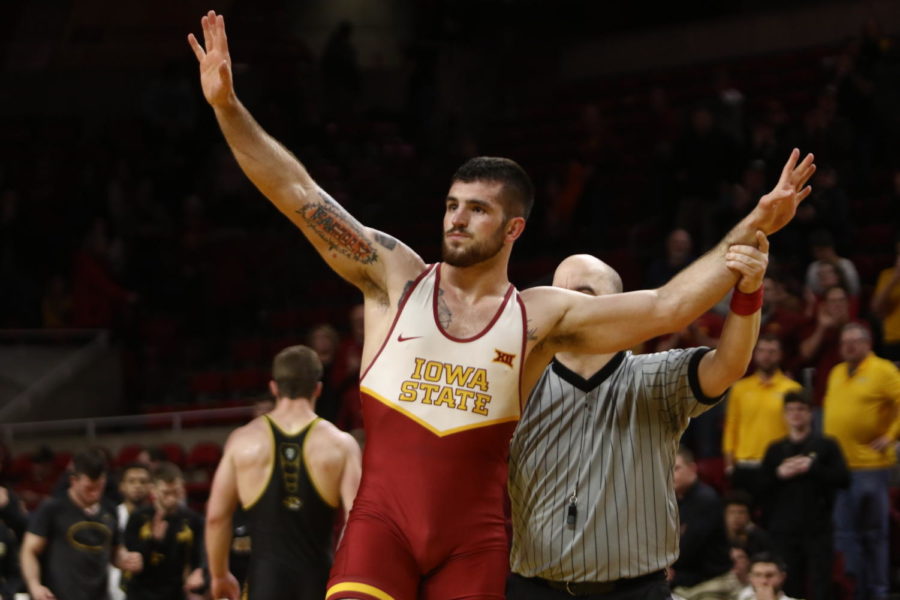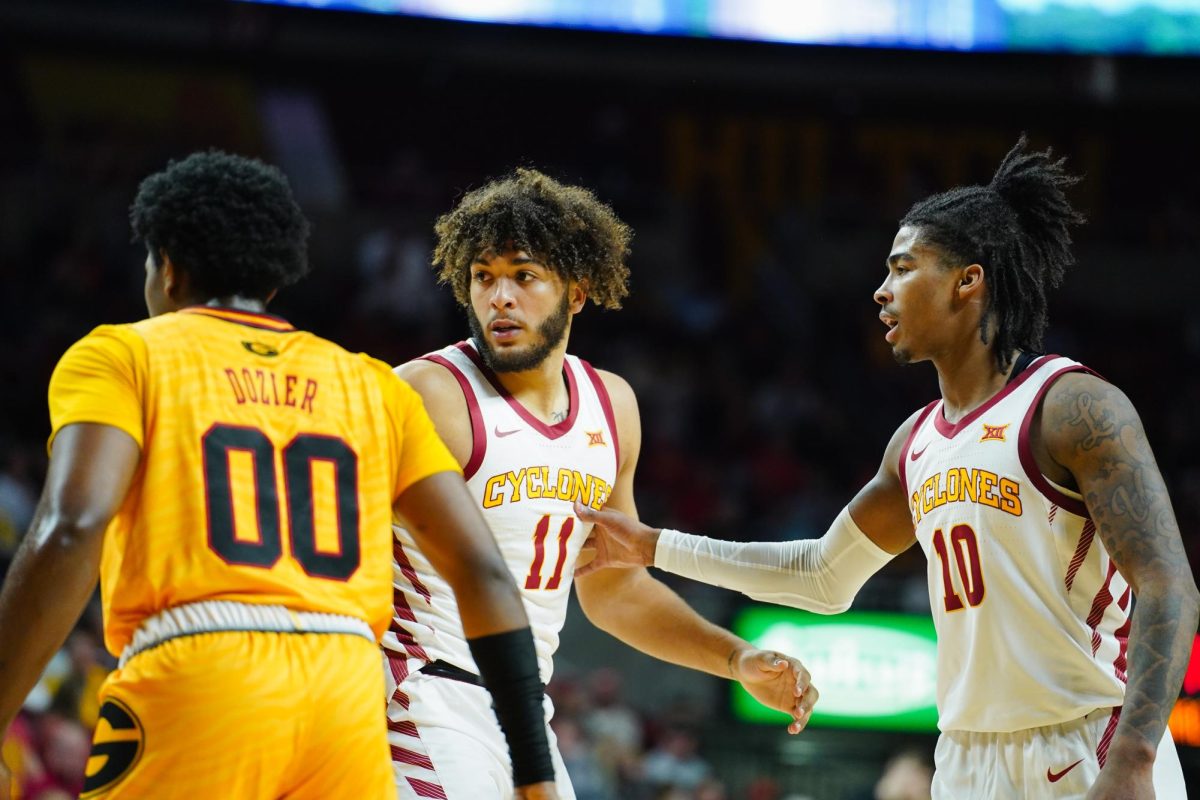Miklus embraces graduate coach position after collegiate wrestling career
December 3, 2019
Willie Miklus is just 26 years old. He finished his undergraduate degree two years ago and is 75 percent done with his master’s.
Still, in those 26 years of life, he has come full circle.
From growing up in Altoona, Iowa, a short 40 minutes from the campus of Iowa State, to now being a graduate assistant coach on the Cyclones staff, Miklus is grateful for the path he’s taken.
“Its kind of definitely chased its way back from where I’m from,” Miklus said. “Still doing exactly what I want to do.”
It’s a path that was tough for him to walk.
Miklus’ dad, Garry, died of amyotrophic lateral sclerosis (ALS) — better known as Lou Gehrig’s disease — in March of this year. He was 58. When he passed away, it was five days before the start of the Big 12 Championships and two weeks before the NCAAs.
As one of the best 197 pounders in the country, Miklus wrestled for his late father.
“I came home just to be closer,” Miklus said. “[Wrestling] was our thing. Predominantly, we talked about wrestling; we didn’t talk about much else. Me and my dad are two different people. But, he’s your father, he’s your dad, he’s that person [I] looked up to ever since I was little boy, that’s a superhero of your universe.”
He turned in a second place finish in Tulsa, then capped off his outstanding collegiate wrestling career with his fourth All-American spot, snaring sixth.
It was the final time Miklus put on a wrestling singlet.
Now, he is embracing the role as a coach on the staff. He admits it’s been an adjustment.
“You have to give up a lot of the control,” Miklus said. “Let’s say we’re doing bike sprints on the assault bikes; I can tell guys to sprint, but ultimately it’s up to them and what they want to put into it and what they want to get out of it. I can give them any sort of advice, but unless they really want to listen and use it, it isn’t going to happen.”
Kevin Dresser said that it wasn’t the plan initially to have him on the staff after his one year in a Cyclones singlet where he posted a 27-6 record, including his 50th career dual victory and 100th career win.
Once he got to learn about his one of two All-Americans a season ago, the decision was an easy one.
“As we got to know him and we got to love him and we got to understand him, it just made more sense,” the third-year head coach said. “We had the money, we had the position — it’s been a great hire for us.”
Miklus was appreciative of the opportunity to jump into the coaching ranks.
“It didn’t affect just me and [my dad], it affected my mom, brothers and my sister,” Miklus said. “So sticking around to make sure everything was okay was definitely something I wanted to [do].”
Growing up, Miklus’ dad was the one who got him started in wrestling. The oldest of four siblings, Miklus was entrenched in the sport from the get-go.
It became a passion once he reached high school.
He garnered two runner-ups and two state championships in high school at four different weight classes — including an undefeated 47-0 senior year — where he registered over 300 takedowns at Southeast Polk.
As a top-100 overall recruit in the 2013 class, Miklus enrolled at Missouri, where he redshirted his first year and finished no lower than fourth at four tournaments. He won the Kaufman-Brand Open and had two third-place finishes.
In his first full year wrestling in the Tigers lineup, his impact was immediate.
Slotted in at 184 pounds, Miklus placed seventh at the NCAA Championships to finish a redshirt freshman year in which he won 33 matches, had a perfect 6-0 conference dual record and defeated four nationally ranked opponents at the NCAAs.
He was named the MAC freshman of the year.
The following year, he was an All-American yet again and went perfect in the conference dual season. His 53 dual points were the second most on the team, as were his seven major decision victories.
All seemed to be going well for Miklus, who was getting ready to start his redshirt junior year.
Not one, but two things got in the way of that.
A season-ending knee injury two matches into the 2016-17 season as well as his father being diagnosed with ALS in April of 2016 prompted Miklus to look at the bigger picture.
“People say, when you’re dying, [it] kind of really puts life into perspective on what is important,” Miklus said. “He wanted more time around his kids and more time around his family.”
He admitted the thought of transferring to Iowa State could’ve happened sooner had it not been for his father remaining active even with the diagnosis.
That made the decision to stay in Columbia easier.
“I knew he was OK and I knew things were OK at home for me to still be at Missouri and me to be that far away,” Miklus said. “For those two years, it wasn’t too bad. I’d be home for spring break and that dude would be like ‘Alright, see you later.’ He was a tough guy and you could see that fighting spirit inside of him. You knew that he was going to do whatever he wanted to do.”
Recovered from the knee injury and bumping up to 197 made his fourth year in a black and gold singlet one for the record books.
Becoming just the seventh Tiger to be a three-time All-American, Miklus grabbed his first-ever conference championship and won 16 of his 24 matches by bonus point victories. He ranked in the top-10 in program history for technical falls in a season, career tech falls and career pins.
As successful as that year was for Miklus — to go along with earning his bachelor’s degree — it was time for a life decision.
His father’s condition was weakening by the day. It left Miklus with what he called one of the biggest decisions of his life: transfer to Iowa State and be closer to his dad.
“It affected me a lot; Columbia was home,” Miklus said. “When you live somewhere for five years, it just becomes home. I knew every restaurant, every bar, every single school building. I spent so much time in Columbia. When I talked to the Missouri coaches, I was like ‘Hey, I’m not coming back next year and here’s why.’ Conversations with them weren’t bad. They weren’t happy conversations, but they knew I was doing what was best. They were proud of me for doing the right thing.”
One glaring reason for coming to Ames was the fact that his dad could see him wrestle. Miklus said his father hadn’t seen him wrestle much at Missouri since the home duals had a lot of travel involved.
That in itself was why Miklus wanted to come and be apart of the rising program that Dresser was developing. Still, he had come to terms that Missouri and Iowa State were going in two different directions.
The Tigers had established themselves as a premier program, and the Cyclones were hoping to become that.
“I had to know it was going to be different,” Miklus said. “The team feel is going to be different, the success of the team is going to be different, the coaching staff was going to be different. I had to come to grips and terms that it was a different place, but the goal is still the same. I had to find a way, on the fly, to adjust.
Like he witnessed during his one and only year as a Cyclone, Dresser has seen members of his team go to Miklus for advice and guidance. He believes it is good for both parties.
“From being his boss, the thing I like [is] he’ll do anything for the program,” Dresser said. “He’s just a really good role model, he lives a very, very clean life. He really is kind of a father figure on the team right now.”
The spot Miklus held in the lineup at 197 is currently entrenched by redshirt freshman Joel Shapiro, but Dresser has said it will be a fluid weight class between Shapiro and fellow redshirt freshman Francis Duggan.
Miklus had nothing but positives to say about the young wrestlers.
“I’ve told them ‘Look, it’s going to be hard, it’s different than high school, but why not?'” Miklus said. “I haven’t tried not to preach too much out of them; I don’t want to freak them out or scare them. Whoever gets the spot, it’s doable. I don’t want them to feel like they have to replace me. This is their career, this is their time in the limelight, this is their opportunity. This is their own chapter. I want them to feel like they’re doing this on their own. Making their own story. Shapiro’s incredibly tough mentally… He doesn’t really act scared or afraid. Duggan, the skill set he has, has such a high ceiling. The way he can move, the way he can wrestle — If I could take bits and pieces off of each of them, I would. They both compliment each other very well.”
Coaching could be in Miklus’ future. He prefers to coach in the college ranks — at a four-year university — regardless of level.
He wants to establish the connections that college wrestling offers.
“You get to know them for about five years and you get to see them change from an 18-year-old kid to a 23-year-old young man,” Miklus said. “I feel like that’s a lot of fun. The division doesn’t really matter, we’ll see.”
Dresser, without hesitation, said he thinks Miklus can have a successful coaching career.
“I think to be a good coach, you have to be very unselfish,” Dresser said. “He’s already able to give a lot to our athletes. You can always learn X’s and O’s, but when you’re about your athletes first, that’s when you become a good coach. I won’t be surprised if he has a rockstar resume by the time he’s 60 years old.”
From his high school coach at Southeast Polk, to Brian Smith at Missouri, to Dresser and all the assistants he’s had, the lessons Miklus has learned each stop along the way have paid off in many ways for what type of coach he wants to be.
“Every single coach I had was incredibly patient,” Miklus said. “I think that’s the biggest one is just patience. I feel like a lot of my coaches knew when to push and when not to push. Some kids you can push all day long and they’re not going to listen to you, some kids will. Getting to know the kids and what sets them off — that’s a big thing too.”
















